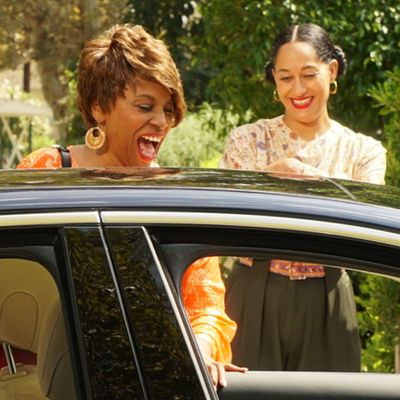
Monopoly makes monsters of us all. How could it not? Hasbro describes the 82-year-old hall-closet staple as a “real-estate trading game,” a benign phrase that belies the exquisite horror that awaits. Monopoly is, after all, the game that boils capitalism down to its bare cannibalistic essence, but replaces dispassionate profiteering with spiteful tit for tats among the people you love the most. It’s a bloodless blood sport that demands ruthlessness, and the games are interminable. If a Monopoly game feels like it took less than a fortnight, it’s because you used the expedited rules.
But as Dre says in “Advance to Go (Collect $200),” Monopoly reveals deeper truths about the players. “How you play reveals who you are,” he says as he gingerly unboxes the game and sets it out for the family. The intro seems like one of the elaborate metaphors Black-ish likes to throw out before bouncing in a totally different direction. Instead, the episode sticks to the game itself, which is smart because once we accept the premise that Monopoly reveals our true selves, an episode structured around it becomes a pure exercise in character-based comedy. In case anyone is still confused about who the Johnsons are, “Advance to Go” should clear up any questions.
Rainbow lays out the parameters for “Black Monopoly,” which adds to the board game the same kind of mean-spirited innovation that black people have been injecting into card games for years. (I’ve seen friendships dissolve over games of Uno.) The Johnsons’ house rules are pretty reasonable compared to some of the insane variations out there. The Free Parking square isn’t just a place to loiter, it’s a potential windfall thanks to the money stuffed under it. Creative dealmaking is welcomed and loans are allowed, but gifts are strictly forbidden. Goofy local accents are encouraged when buying a property like Kentucky Avenue. But that part becomes awkward if you’re Megan, Junior’s white girlfriend, and you try to approximate Caribbean patois. (Give her a break, alright? Her family vacationed at Sandals.)
The most interesting Johnson family Monopoly rule is a buddy system in which everyone teams up with an equal business partner. The rule essentially turns the exercise into a couples’ game night, with Dre and Bow, Pops and Ruby, and Junior and Megan all paired off. The other team is Jack and Diane, whose differences make them a rudderless odd couple once they’re tossed onto the mean Atlantic City streets. If there’s a childish, gloating, end-zone moonwalker hiding anywhere inside a person, Monopoly will coax it out. So it comes as no surprise when Dre reverts to season-one mode and becomes a total jerk. After he hits a hot streak when Bow leaves the room, Dre fires his own wife, banishing her to Jack and Diane’s team.
For a while, Dre is on fire, convinced he’s rid himself of his bad luck charm. But life comes at you fast in Monopoly, and three bad rolls of the dice are all that separate you from insolvency. A few wrong turns and Dre is left with his bridges burned and nowhere left to turn. Not even Ruby will toss him a loan from the stack of colorful cash she has stuffed inside her bra. “I’m Donald Trump!” Dre says, both when he realizes he’s steamrolled his way to a real-estate empire and when he realizes that once the money is gone, all he’s left with is a long list of enemies. Completing his descent into brattiness, Dre flips the game board after Jack (with an assist from the rest of the family) delivers the final death blow. In his defense, everyone has done something during a Monopoly game that they’d gladly take back.
All’s well that ends well, since everyone gets $100 of real cash when Dre flips the table per another one of the Johnsons’ house rules. But better still, Dre realizes that Rainbow’s lack of guile might be irritating during game night, but their differences are what allows them to complement each other so well. Even Pops and Ruby get their groove back during the game, to the point that they start talking about rekindling their tumultuous romance. But let’s be honest: As adorable as their relationship is, the likely outcome of Pops and Ruby getting back together is them being told to go directly to jail in a non-Monopoly context.

